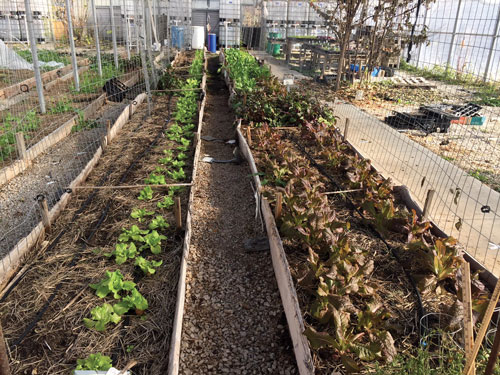1/1/2018
Fostering a Community of Growers
Anne-Marie Hardie

Approximately five minutes from downtown Kansas City, Missouri, is a greenhouse operation focused on spreading the message of urban farming. In fact, over its five years of operation, Antioch Urban Growers has evolved into one of Kansas City’s top sustainable living initiatives. Their slogan, “We are rooting for you,” embodies their vision of becoming not just a growing facility, but a support network that guides children, youth and adults into the world of agriculture.
The story of this operation began when Mark Samborski was contemplating what his upcoming retirement from the ministry would look like. During this time, Mark came across a rundown nursery and greenhouse facility that had sat vacant for several years. The dilapidated property was soon to be sold at a local auction.
“The property was completely overgrown, but it was full of potential,” said Mark. And so, Mark with his brother Jeff, pooled their funds to secure the winning bid.
Pictured: The goal for Antioch Urban Growers is to allow people to taste, smell and feel what produce should truly look like. This includes growing organic, non-GMO seeds in a pesticide-free environment.
The two brothers, who had grown up on a cattle farm, ventured into resurrecting the badly run-down building and property. Instead of doing a clean sweep of all produce, Mark decided to retain the 30-year-old grapes and 15-year-old figs that had survived the period of abandonment. The 12,000-sq. ft. of greenhouse were used to house bedding plants and create a space where the community could wander through the beauty of nature.
However, Mark envisioned doing much more with the property, wanting to create not just a space to purchase plants, but a business that could give back to the community. His interest was piqued when he came across the fact that heirloom seeds and its associated produce were becoming increasingly more challenging to obtain.
“We started to grow everything heirloom and organic from seed and sell the produce at the local farmers market. I believed that sustainable living was the way to go,” said Mark.
So Antioch Urban Growers began to emphasize the challenges with food production, including educating individuals on what this lack of fresh, local food could mean to sectors of the community.
“Cities are going to see the hardest impact when it comes to fresh, local produce,” said Mark. “I don’t think that good food will become a part of the establishment unless communities began to plug into the possibilities of urban farming.”
In Kansas City alone, shared Mark, there are currently a lot of food deserts, particularly in the downtown area, where people lack access to fresh local food. Education and demonstration became a large portion of the new business with Antioch Urban Growers, bringing in segments of the community—including inner city youth and the autistic community—to become a part of the process of growing.
The goal for Antioch Urban Growers is to allow people to taste, smell and feel what produce should truly look like. This includes growing organic, non-GMO seeds in a pesticide-free environment. As part of their sustainability initiatives, only rainwater is used to water the plants in the greenhouse.
But the project of Antioch Urban Growers is so much more than a place to purchase produce and bedding plants. The goal for Mark was to develop a space that would educate and bring a variety of segments of the community together.
“The other day, a busload of children came by. They had never seen chickens before,” said Mark. “They were able to interact with bees, plant sunflower seeds, transplant plants and experience farm life just outside of the city.”
The programs vary from day-long activities and summer camps to extensive programs depending on the community’s need at the time. At the moment, Antioch Urban Growers is currently working with two separate organizations—Easter Seals and their local school district—to develop unique, six-week programs where the clients diagnosed with autism have hands-on experience with a variety of horticulture tasks.
“They’ve learned to dig holes, mix soil, work with cuttings, even paint containers—whatever needs to be done at our facility during that time,” said Mark. Future plans include more well-defined, six- to 12-week programs where the individuals work on specific projects—for example, taking care of the chickens through the entire life cycle.
“The greenhouse is our classroom,” said Mark. “People came together from so many different directions to bring this vision from a dream into a reality.”
One interesting segment that Antioch Urban Famers has met is what they fondly call “the new millennium of pioneer women.” This unique sector of the community is educated, goal-oriented women who are striving to return to a healthier lifestyle.
“These incredibly gifted women, from retirees to Millennials, see the need for change” said Mark. “And are flexing their muscles in areas that can make the most difference for the future.”
Future plans include building a 12-ft. by 12-ft. refrigeration system that will eventually become a part of the food hub. The goal for this initiative is to bring all the local farmers’ produce into one area, a hub, which will then be distributed into the bigger city.
“We are currently working on building trust with the local farmers and developing these relationships,” said Mark.
Antioch Urban Farmers also strives to assist sister farms in developing ventures of their own. Their hope is that the Kansas City location can become a model for other cities.
“This is more of a mission than a business for me,” said Mark. “People are looking for a change; they want local food. It is our goal to revive the small farms by building a community that allows these farms to prosper.” GT
Anne-Marie Hardie is a freelance writer/speaker from Barrie, Ontario, and part of the third generation of the family-owned garden center/wholesale business Bradford Greenhouses in Barrie/Bradford, Ontario.